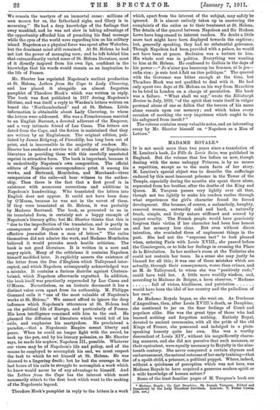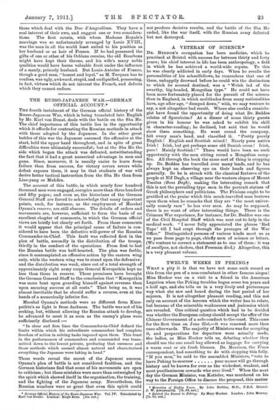MADAME ROYALE.* IT is not much more than two years
since a translation of M. Lenetre's book, La Fills de Louis Seize, was published in England. But the volume that lies before us now, though dealing with the same unhappy Princess, is by no means a repetition, except as to the main facts of her story. M. Lenotre's special object was to describe the sufferings endured by this most innocent prisoner in the Tower of the Temple, especially during the months she spent there alone, separated from her brother, after the deaths of the King and Queen. M. Turquan passes very lightly over all that, though not too lightly to make his readers realise through what experiences the girl's character found its forced development. She became, of course, a melancholy, haughty, reserved woman, outwardly cold and hard, a naturally frank, simple, and lively nature stiffened and soured by unjust cruelty. The French people would have graciously forgiven their victim if her character had been less honest and her memory less clear. But even without direct intention, she reminded them of unpleasant things in the past. She had not the "supreme tact" to look pleased when, entering Paris with Louis XVIII., she passed before the Conciergerie, or to bide her feelings in crossing the Place de in Revolution. In her mother's room at the Tuileries she could not restrain her tears. In a sense she may justly be blamed for all this ; it was one of those mistakes which are actually, through their consequences, worse than crimes, and so M. de Talleyraud, to whom she was "positively rude," could have told her. A little more worldly wisdom, and, according to Madame de Boigne, a keen observer, "Madame full of virtue, kindliness, and patriotism would have been the idol of her country and the palladium of her race."
As Madame Royale began, so she went on. As Duchesse d'.Angouleme, then, after Louis XVIII.'s death, as Dauphine, she continued to jar on the finer feelings of Court and populace alike. She was the great type of those who had learned nothing and forgotten nothing. Entirely Royal, devoted to ancient ceremonies, with all the pride of the old Kings of France, she possessed and indulged in a plain. speakinghonesty quite her own. She was a worthy descendant of Louis XIV., without his magnificently charm- ing manners, and she did not perceive that such manners, or their equivalent, were equally necessary to Royalty in the nine- teenth century. She never conquered a certain shyness and embarrassment, the natural outcome of her early training—that of a spoilt child, a prisoner, a political puppet. Where, indeed, without a quickness of perception which was not hers, was Madame Royale to have acquired a generous modern spirit or a wide knowledge of human nature P Some of the least familiar pages of M. Turquan's book are
* Mad4771,6 Royale: the Lost Pauphine. By Joseph Turquan. Edited and Translated by the Lady Theodora Davidson. London: T. Fisher Unedn. [158. net.J those which deal with the Due d'Ingoule. me. They have a real interest of their own, and suggest one or two considera- tions. The first cousin, with whom Madame Royale's marriage was so unfortunately arranged by Louis XVIII., was the man in all the world least suited to his position as her husband or as heir of France. If he had possessed the gifts of one or other of his Orleans cousins, the old Bourbons might have kept their throne, and his wife's many noble qualities would have borne valuable fruit under the influence of a manly, princely husband. But Louis-Antoine of France, though a good man, "honest and loyal," as M. Turquan has to confess, was ugly, awkward, stupid, and undignified, possessing, in fact, virtues which do not. interest the French, and defects which they cannot endure.



















































 Previous page
Previous page